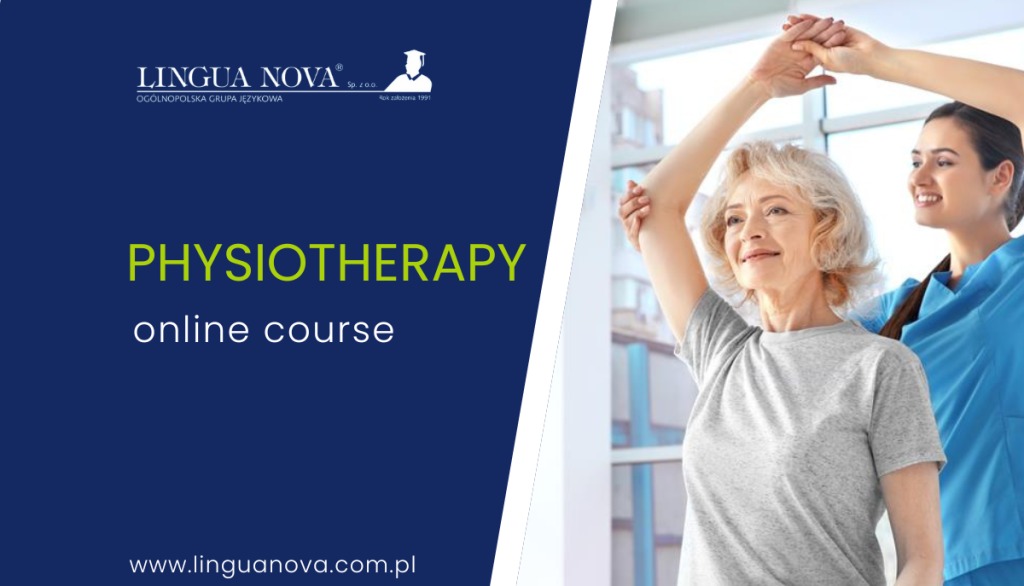Physiotherapy in English – Enhance Your Professional Skills
Physiotherapy (also known as Physical Therapy, PT) is a branch of medicine that focuses on diagnosing, treating, and preventing disorders of the musculoskeletal system, as well as improving the overall physical fitness of patients. Moreover, it is a key component of the rehabilitation process, helping patients recover full mobility after injuries, reduce pain, and prevent future injuries. Consequently, modern physiotherapy requires not only advanced clinical skills but also knowledge of contemporary medical terminology, including specialized English vocabulary. Therefore, in this article, we will show how a physiotherapy course in English can help you enhance your professional skills, enabling you to gain the necessary knowledge for working in an international medical environment.
Why is Physiotherapy in English Important?
English is the international language widely used in medicine and health sciences. For instance, modern scientific research, articles, publications, and educational materials related to physiotherapy are largely produced in English. Furthermore, physiotherapists and rehabilitation specialists are increasingly dealing with English-speaking patients or working in international medical facilities. As a result, proficiency in specialized English terminology is an invaluable asset. Not only does it facilitate more effective communication, but it also ensures a better understanding of medical procedures and the latest discoveries in the field of rehabilitation. Therefore, mastering English in this context can significantly enhance one’s professional capabilities.
Lingua Nova Offer – Online Physiotherapy Course in English
Lingua Nova offers the Physiotherapy in English course, designed for anyone looking to improve their language skills in this field. The course is available online, providing flexibility for learners to study at their own pace, at a time and place that is most convenient. It not only covers the theoretical foundations of physiotherapy but also includes practical phrases and expressions that are useful in the daily work of a physiotherapist.
The offer is aimed at both individuals who wish to improve their language skills in physiotherapy and institutions looking to purchase a platform for their students or staff.
Please feel free to contact us via email at kursy@linguanova.com.pl or by phone at +48 503 196 762.
What Does the Physiotherapy in English Course Look Like?
The learning material for the Physiotherapy in English course is carefully structured into modules, each containing both theoretical and practical components. Firstly, the theoretical section focuses on introducing specialized English vocabulary that is essential for those working in the physiotherapy sector. Moreover, this part ensures learners build a strong foundation of industry-specific terminology.
Practical exercises are incorporated to reinforce the acquired vocabulary and improve language proficiency. These exercises not only help learners practice but also assess their mastery of individual sections of the material. In addition, each module on the platform features a glossary, offering clear explanations of more complex terms and their Polish equivalents, which further aids comprehension.
Ultimately, the entire physiotherapy course, like others available on the platform, concludes with a comprehensive final test. This ensures that learners are well-equipped with the knowledge and language skills needed to excel in an international medical environment.
Course Content Includes:
- WORK SUMMARY, PHYSIOTHERAPY SPECIALTIES AND GENERAL THERAPIES – an overview of physiotherapy, specialties, and general therapies.
- HUMAN ANATOMY – human anatomy.
- MUSCULOSKELETAL SYSTEM – the musculoskeletal system.
- INTEGUMENTARY SYSTEM – the integumentary system.
- CARDIOVASCULAR SYSTEM – the cardiovascular system.
- RESPIRATORY SYSTEM – the respiratory system.
- GASTROINTESTINAL SYSTEM – the gastrointestinal system.
Key Physiotherapy Terms in English:
Diagnostics and Assessment:
- Posture analysis – the process of evaluating the alignment of a person’s body.
- Range of motion (ROM) – the measurement of the distance and direction a joint can move.
- Gait assessment – the analysis of a person’s walking pattern.
- Muscle strength testing – evaluating the strength of muscles through various methods.
Therapeutic Methods:
- Kinesiotherapy – therapeutic exercises designed to improve movement and strength.
- Physical modalities or electrotherapy – treatments using devices like ultrasound therapy or TENS (Transcutaneous Electrical Nerve Stimulation).
- Therapeutic massage – manual manipulation of muscles to relieve pain and improve circulation.
- Manual therapy – hands-on techniques used to manipulate joints and tissues.
- Kinesiology taping – a therapeutic method using adhesive tape to support muscles and joints.
- Hydrotherapy – treatment using water for pain relief and rehabilitation.
Applications:
- Orthopedic rehabilitation – recovery and treatment following musculoskeletal injuries.
- Neurological physiotherapy – rehabilitation for patients with neurological conditions.
- Sports physiotherapy – physiotherapy focusing on sports-related injuries.
- Post-surgical rehabilitation – recovery programs following surgery.
- Chronic pain management – strategies and therapies to manage long-term pain.
Physiotherapy Goals:
- Pain relief – reducing or eliminating pain.
- Mobility improvement – enhancing the movement and functionality of joints and muscles.
- Strengthening muscles – exercises aimed at increasing muscle strength.
- Preventing injuries – techniques and exercises to avoid future injuries.
Specialists:
- Physiotherapist – a healthcare professional specializing in physiotherapy.
- Rehabilitation specialist – a professional specializing in physical rehabilitation.
Did You Know?
The father of modern physiotherapy is Pehr Henrik Ling (1776–1839), a Swedish physician and educator who created the foundation for the discipline. He developed a system of physical exercises that were used for treatment, rehabilitation, and improving overall physical fitness, laying the groundwork for physiotherapy as a scientific discipline.
Invest in Your Future!
Investing in the Physiotherapy in English course is an investment in your professional future. The course provides you with essential skills that are increasingly in demand in the international medical environment. Gain the knowledge that will allow you to work with patients worldwide and stay up-to-date with the latest advancements in rehabilitation.
Sign up today!
Email: kursy@linguanova.com.pl
Phone: +48 503 196 762
Visit our platform today: eschool.linguanova.com.pl
Other medical-themed training available on the platform includes:
Lingua Nova – Profesjonalne szkolenia językowe
Wspólna 41, 00-519 Warszawa
https://agencjatlumaczen.com.pl;
kursy@linguanova.com.pl
tel. 22 5841010 lub 668 041 729

Visit our platform today to learn more: https://eschool.linguanova.com.pl
Skontaktuj się z nami
Wspólna 41/2p, 00–519 Warszawa
